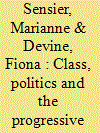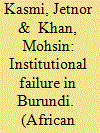| Srl | Item |
| 1 |
ID:
152551


|
|
|
|
|
| Summary/Abstract |
This article considers contemporary class inequalities and how they might shape a progressive politics in the UK. Drawing on findings from the BBC Class Survey, it outlines changes in the class structure, class mobility and class identities. It is argued that the class structure is increasingly polarised and fragmented, with a wealthy elite, a vulnerable precariat and fragmented middle and working classes in between. Declining upward social mobility is a source of anxiety for middle-class and working-class parents alike. Class identification, especially working-class identification, has weakened over time, although class snobbery is far from dead. Class has changed and the class basis of politics is changing now too. A progressive politics is possible if the political parties of the centre-left appeal to the majority of the electorate rather than one class, acknowledge common concerns and worries and appeal to shared hopes and dreams that straddle class boundaries.
|
|
|
|
|
|
|
|
|
|
|
|
|
|
|
|
| 2 |
ID:
182431


|
|
|
|
|
| Summary/Abstract |
Ethnic and land conflicts have recently gained significance in peace and conflict resolution. It is imperative to understand both endogenous and exogenous factors and their relations towards the institutional, democratic, and state-building process to mediate the risks of class and land conflicts. This paper attempts to identify historical relations of land and class structure by analysing Burundi land and class conflict and its significance for peace and stability. We found that the imbalance of land ownership and class structure in a society leads to armed conflicts, leading to an outbreak of other social conflicts, including violence, forced displacement, paralyzed land governance, and power relations changes. Hence, there is a dire need to foster reintegration and reconciliation through balanced multiple diplomacies in Burundi, enhancing state legitimacy towards sustainable land tenure security, improving state capacity, and ensuring justice in the reconciliation process, in association with local and regional powers.
|
|
|
|
|
|
|
|
|
|
|
|
|
|
|
|